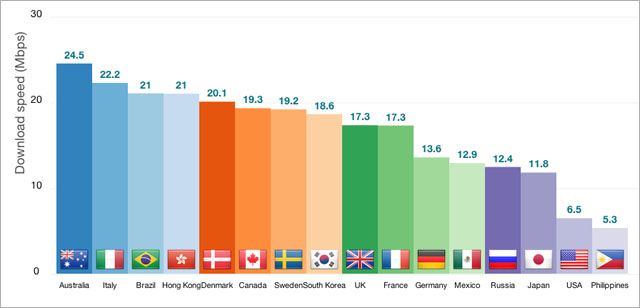blog Impressed by the 4G speeds offered by your provider, whether it’s Telstra, Optus or Vodafone? You should be. According to a new study of 4G/LTE mobile speeds around the world, Australia has the fastest average speeds in the world. Click here to access the full study by OpenSignal, a company attempting to catalogue the world’s wireless broadband points. A few sample paragraphs:
“Australia has the fastest average LTE speeds in the world, with the USA and the Philippines coming in the slowest of our qualifying countries. Claro Brazil are the fastest LTE network in the world, averaging an exceptionally fast 27.8Mbps – although their poor ‘Time on LTE’ performance shows that the roll-out is far from complete.
… Most of the country averages have stayed broadly the same, with only minor improvement or deterioration in service. Australia and Japan have made the biggest improvements, with Australia’s average speeds increasing 42% to 24.5Mbps and Japan improving 66% to 11.8Mbps. The USA suffers the biggest decline, with average speeds falling 32% to 6.5 Mbps, the second slowest global average.”
This is no real surprise, as Australia has been out front in the 4G race for some time, owing principally to the fact that then-Telstra chief executive Sol Trujillo decided to almost completely rebuild Telstra’s mobile network from 2005. At the time, the move was heavily criticised, but with hindsight it looks visionary. It also forced both Optus and Vodafone (after the merger with Hutchison) to plough billions of dollars into network upgrades to keep up. Now Australia (or more precisely, Telstra) is reaping the benefits. Our smartphones perform better, courtesy of their network support, than smartphones anywhere else in the world.
Image credit: OpenSignal


“Now Australia (or more precisely, Telstra) is reaping the benefits. Our smartphones perform better, courtesy of their network support, than smartphones anywhere else in the world^^.”
^^ Unless you live outside metropolitan areas, in which case, the network is still pretty darn choppy unless you’re on 2G/GSM ;)
I am getting 78.77Mbps down and 17.4Mbps up on Optus. This is with three bars. The other day it was 95Mbps down. If only I could buy service from Optus, that did not require selling my house to afford. Then we could just tell Abbott take his CBN and screw himself.
Unfortunately Craig that is not possible.
The reason the service works well is because it costs so much if it was cheap then many people would use it causing the speed to drop to Dial up speeds or worse.
I know this based on real world experience unfortunately we moved into a new house connected to a RIM which forced ~50% of the population to use wireless from 4pm till midnight the connection slowed to dial-up at best and timeout after timeout at worst.
Oh, I meant a cheap plan just for me. Bugger everyone else. :-) I understand how it works. If only the abbott and turnbull circus did. I need upload speed more than anything. Sitting there looking at 17.4Mbps up compared with my fixed line speed of 550kbps. Makes me cry.
AJ is right – I’d bet Australia’s 4G is far less congested because of the high cost of data.
Also the increased latency and inconsistency of performance means it will never be a replacement for fixed line – as has been said countless times, mobile broadband is complementary to fixed line, not a replacement.
Fast 4G but comparatively slow CBN…
Very nice! Too bad that there isn’t enough electromagnetic spectrum for cellular data to be able to replace fixed line for most users in highly populated areas, or the CBN rubbish wouldn’t be such a problem.
4G is pretty great as a complimentary technology still.
I liked the dollars per speed graph.
yes it’s fast, especially when you’re connected to LTE via smartphones, but the coverage is not that good outside the metro some areas without 4G, unless you’re on 2G. So in my opinion mobile broadband is not an alternative to a fixed line, but an add-on.
Comments are closed.